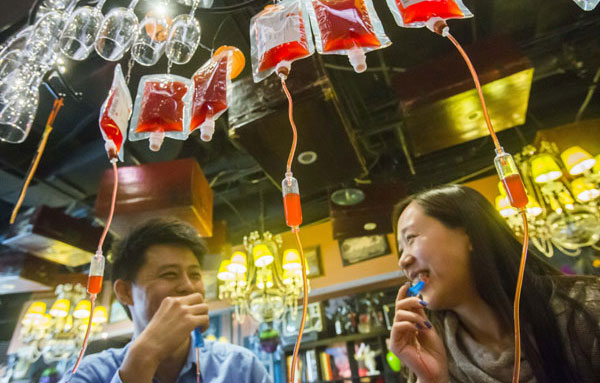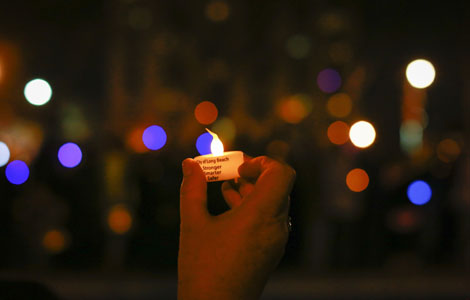HIV epidemic needs education, not bath house bans
Updated: 2013-10-31 08:26
By Chris Davis (China Daily USA)
|
||||||||
NEW YORK JOURNAL
China’s State Council ignited a firestorm recently when it posted a draft regulation on its website requiring public bathhouses, spas, hot springs and saunas to prominently post signs banning “people with sexually transmitted diseases, AIDS and infectious skin diseases”.
An outcry condemning the move followed, including a stern condemnation from the United Nation’s AIDS (UNAIDS) agency. Hedia Belhadj, China country coordinator for the agency, called the proposed Ministry of Commerce rule discriminatory, adding that there is no risk of HIV transmission in a bath house or spa.
“UNAIDS recommends that restrictions preventing people living with HIV from accessing bath houses, spas and other similar facilities be removed from the final draft of this policy,” Belhadji said.
“The only value of this draft law is in discriminating against those with AIDS,” said Yu Fangqiang, director of an anti-discrimination NGO called Justice for All, based in Nanjing. “This law must be changed. All the HIV NGOs know this new rule and they want to fight it.”
Wu Hao of the Beijing Research Centre on Sexually Transmitted Disease and Aids told the Beijing Morning News that “there is no evidence that people can be infected with HIV in public bath houses”.
“Apparently,” Wu continued, “the rule to bar HIV patients from entering public bath houses is way over the top.”
AIDS advocate Chang Kun told Radio Free Asia that the rule would “exacerbate discrimination and demonize people living with HIV as a group, so that recruiters for civil service and teaching jobs will use it as an excuse to refuse to hire them.
“It shows a lack of understanding about the basic facts about HIV/AIDS, and people could get the wrong idea about how it is transmitted,” Chang added.
Members of the spa and bath house industries have told reporters that it is not possible to enforce the regulation because their staffs have no way of telling if a person is HIV positive.
According to AVERT, a UK-based HIV and AIDS charity, China’s first case of AIDS was reported in 1985 in Beijing. Today, there are an estimated 780,000 people living with HIV in China and 28,000 people died of AIDS there in 2011.
The numbers, AVERT says, must be taken in the context of China’s “extremely large population”.
“Although China’s HIV epidemic remains one of low prevalence overall (less that 0.1 percent among adults) there are pockets of high infection among specific sub-populations and the danger of the epidemic spreading further into the general population persists,” the AVERT website says.
Most — 70 percent to 80 percent — of those infected with HIV in China live in six of China’s 33 provinces: Yunnan, Guangxi, Henan, Sichuan, Xingiang and Guangdong. Traditionally, transmission of the virus has been through drug users sharing contaminated needles, former plasma recipients and infected men who have sex with men. Recently however, AVERT says, “HIV has bridged to the general population, and now heterosexual sex has become the dominant transmission route. Nearly half of all people living with HIV at the end of 2011 were infected through heterosexual transmission”.
AVERT faults China on its failure to educate people about AIDS through the 1980s and 1990s, and that stigma and fear lead to hidden epidemics that resist health campaigns. But, they say, a 2011 survey showed that basic HIV knowledge was high among young students. Still, a 2008 survey found, among other things, that 38 percent thought they could become infected through mosquito bites, 48 percent would not eat with someone infected with HIV and 32 percent thought people with HIV or AIDS deserved their condition because of their drug use or sexual behavior.
Women’s rights activist Ye Haiyan told Radio Free Asia that the proposed regulations on bath houses and spas are a step backwards and that the government has a long way to go to educate people about HIV/AIDS. “They haven’t really organized any good campaigns,” Ye said.
The UN’s Belhadj said that the Chinese government should also revise “any policies preventing people living with HIV from accessing public or private services”.
One Weibo user weighed in on the issue: “HIV patients are already vulnerable. They should be protected and respected. We must not further harm them with discrimination.”
Contact the writer at chrisdavis@chinadailyusa.com

 Color-blind love
Color-blind love
 Lenovo's new secret weapon: Hollywood star
Lenovo's new secret weapon: Hollywood star
 Brussels visit heralds closer trade ties for EU and China
Brussels visit heralds closer trade ties for EU and China
 Halloween gaining popularity but still sees cultural differences
Halloween gaining popularity but still sees cultural differences
 US embassy accused as 'spy hub'
US embassy accused as 'spy hub'
 Halloween beverage offers vampire experience
Halloween beverage offers vampire experience
 Lenovo launches new Yoga tablet
Lenovo launches new Yoga tablet
 Sandy anniversary
Sandy anniversary
Most Viewed
Editor's Picks

|

|

|

|

|

|
Today's Top News
US business council wants market-barriers reduced
Benefit held for NYC official’s ex-campaign treasurer
HIV epidemic needs education, not bath house bans
Survey examines education gap
Chinese cities victim of US spying scheme
Legislation to help reduce pollution
Govt pledges more housing
Halloween gains popularity in China
US Weekly

|

|





